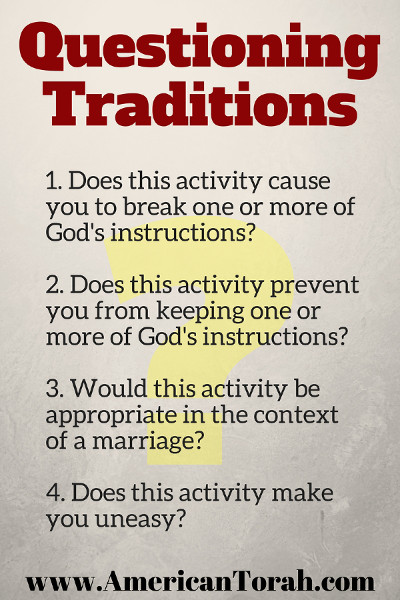Traditions are wonderful and powerful forces for creating and reinforcing the bonds of family, community, and nation. Shared experiences even bind together generations separated by centuries. For example, people have been singing hymns at church and synagogue for thousands of years. If you were to travel back in time to a first century congregation, the shared traditions of singing hymns and reading and studying the Scriptures would unite you with those ancient believers in a meaningful way despite the vast linguistic and cultural differences.
Traditions inform our language by filling our words and expressions with meaning. One or two words between two people with a shared culture might contain unspoken volumes. Weddings. Independence Day. Thanksgiving dinner. Christmas sweaters. Merit badges. I know what images these words invoke in the minds of most readers because I see them in my own mind, while they might be meaningless to a Hindu in Jaipur.
Not every tradition is good. Some traditions are tainted by origins in idolatry; others require active participation in sin. Jeremiah prophetically quoted future gentiles turning to God’s truth:
Our fathers have inherited nothing but lies, worthless things in which there is no profit. (Jeremiah 16:19)
But I love tradition! We all have traditions we love dearly. And tradition…it loves us too, so much that it doesn’t want to let go. The very qualities that give tradition so much community reinforcing power, also give it claws that grip deeply.
When confronting the Pharisees and Scribes concerning man-made traditions that caused people to break God’s commandments, Yeshua said:
Well did Isaiah prophesy of you hypocrites, as it is written, ‘This people honors me with their lips, but their heart is far from me; in vain do they worship me, teaching as doctrines the commandments of men.’ You leave the commandment of God and hold to the tradition of men. (Mark 7:6-8)
Men who spent their entire lives studying God’s Law couldn’t bring themselves to give up traditions that violated it. For the most part they couldn’t even see that there was a problem. Traditions can become so much a part of who we are that they become semi-invisible.
Even so, we do have to try to see them. When we stand before Yeshua one day, we don’t want to hear the same words he spoke to the Pharisees.
Yeshua gave his life so that we wouldn’t be condemned for our imperfections, but he didn’t give his life so that we could ignore God’s Law either. Fortunately, we don’t have to empty out every room and shine a light into every corner of our lives today. What we need right now is a desire to find and remove the things in our lives that are displeasing to God. The actual removal will take time and we have to be okay with that, both in ourselves and in others.
 I recommend asking yourself a few simple questions to determine if any tradition or habit or activity is something you need to stop:
I recommend asking yourself a few simple questions to determine if any tradition or habit or activity is something you need to stop:
1. Does this activity cause you to break one or more of God’s instructions? If yes, stop. If no, carry on.
2. Does this activity prevent you from keeping one or more of God’s instructions? If yes, stop. If no, carry on.
3. If possible, place the activity into the context of a marriage with God as the husband and you as the wife. Would this activity be appropriate in that context? Would it please your husband? If no, stop. If yes, carry on.
4. Does this activity make you uneasy? If yes, go back to question 1. If no, enjoy!
Finally, don’t panic. God doesn’t expect you to do everything perfectly from day one.
Or ever.
There will always be another dustbunny to sweep up, a stain to scrub out. In this life you will never be perfect. Fortunately, God is willing and eager to forgive those who approach him with a right heart, which means a desire to do the right thing even if we can’t always tell what that is.
Understand that God knows you. He knows what’s in your mind and in your heart. On one hand, this understanding ought to have us quaking in our boots. God is privy to every dark thought we entertain. But on the other hand, nobody is any different, and if an evil inclination was a barrier to God’s love, then we would all be lost. This was the very reason that Yeshua shed his blood. It covers over our flaws and washes away our sins so that we can approach God without fear of condemnation so long as we are committed to working out our salvation through continual improvements in our behavior and thoughts.
Cleaning the inherited lies from the dark recesses of life’s closets is important–it’s commanded–but having faith in God’s mercy to overlook the flaws that we have been unable (but not unwilling!) to address is even more important.
Start somewhere because starting everywhere isn’t possible and starting nowhere means we have no faith at all. Don’t get too uptight about all the places you haven’t cleaned yet. Knowing that there is more work to be done is one way that we know we’re on the right track. When you think you’ve got your house completely in order, then you can really start to panic.
Everything that Yeshua (aka Jesus) & the Apostles taught
Come with me as I draw out the connections that are so often missed |

